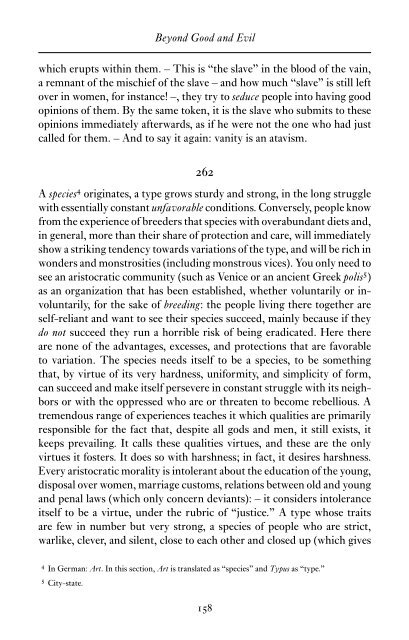Beyond Good and Evil: Prelude to a Philosophy of the Future - EILFE
Beyond Good and Evil: Prelude to a Philosophy of the Future - EILFE
Beyond Good and Evil: Prelude to a Philosophy of the Future - EILFE
You also want an ePaper? Increase the reach of your titles
YUMPU automatically turns print PDFs into web optimized ePapers that Google loves.
<strong>Beyond</strong> <strong>Good</strong> <strong>and</strong> <strong>Evil</strong><br />
which erupts within <strong>the</strong>m. – This is “<strong>the</strong> slave” in <strong>the</strong> blood <strong>of</strong> <strong>the</strong> vain,<br />
a remnant <strong>of</strong> <strong>the</strong> mischief <strong>of</strong> <strong>the</strong> slave – <strong>and</strong> how much “slave” is still left<br />
over in women, for instance! –, <strong>the</strong>y try <strong>to</strong> seduce people in<strong>to</strong> having good<br />
opinions <strong>of</strong> <strong>the</strong>m. By <strong>the</strong> same <strong>to</strong>ken, it is <strong>the</strong> slave who submits <strong>to</strong> <strong>the</strong>se<br />
opinions immediately afterwards, as if he were not <strong>the</strong> one who had just<br />
called for <strong>the</strong>m. – And <strong>to</strong> say it again: vanity is an atavism.<br />
262<br />
A species 4 originates, a type grows sturdy <strong>and</strong> strong, in <strong>the</strong> long struggle<br />
with essentially constant unfavorable conditions. Conversely, people know<br />
from <strong>the</strong> experience <strong>of</strong> breeders that species with overabundant diets <strong>and</strong>,<br />
in general, more than <strong>the</strong>ir share <strong>of</strong> protection <strong>and</strong> care, will immediately<br />
show a striking tendency <strong>to</strong>wards variations <strong>of</strong> <strong>the</strong> type, <strong>and</strong> will be rich in<br />
wonders <strong>and</strong> monstrosities (including monstrous vices). You only need <strong>to</strong><br />
see an aris<strong>to</strong>cratic community (such as Venice or an ancient Greek polis 5 )<br />
as an organization that has been established, whe<strong>the</strong>r voluntarily or involuntarily,<br />
for <strong>the</strong> sake <strong>of</strong> breeding: <strong>the</strong> people living <strong>the</strong>re <strong>to</strong>ge<strong>the</strong>r are<br />
self-reliant <strong>and</strong> want <strong>to</strong> see <strong>the</strong>ir species succeed, mainly because if <strong>the</strong>y<br />
do not succeed <strong>the</strong>y run a horrible risk <strong>of</strong> being eradicated. Here <strong>the</strong>re<br />
are none <strong>of</strong> <strong>the</strong> advantages, excesses, <strong>and</strong> protections that are favorable<br />
<strong>to</strong> variation. The species needs itself <strong>to</strong> be a species, <strong>to</strong> be something<br />
that, by virtue <strong>of</strong> its very hardness, uniformity, <strong>and</strong> simplicity <strong>of</strong> form,<br />
can succeed <strong>and</strong> make itself persevere in constant struggle with its neighbors<br />
or with <strong>the</strong> oppressed who are or threaten <strong>to</strong> become rebellious. A<br />
tremendous range <strong>of</strong> experiences teaches it which qualities are primarily<br />
responsible for <strong>the</strong> fact that, despite all gods <strong>and</strong> men, it still exists, it<br />
keeps prevailing. It calls <strong>the</strong>se qualities virtues, <strong>and</strong> <strong>the</strong>se are <strong>the</strong> only<br />
virtues it fosters. It does so with harshness; in fact, it desires harshness.<br />
Every aris<strong>to</strong>cratic morality is in<strong>to</strong>lerant about <strong>the</strong> education <strong>of</strong> <strong>the</strong> young,<br />
disposal over women, marriage cus<strong>to</strong>ms, relations between old <strong>and</strong> young<br />
<strong>and</strong> penal laws (which only concern deviants): – it considers in<strong>to</strong>lerance<br />
itself <strong>to</strong> be a virtue, under <strong>the</strong> rubric <strong>of</strong> “justice.” A type whose traits<br />
are few in number but very strong, a species <strong>of</strong> people who are strict,<br />
warlike, clever, <strong>and</strong> silent, close <strong>to</strong> each o<strong>the</strong>r <strong>and</strong> closed up (which gives<br />
4 In German: Art. In this section, Art is translated as “species” <strong>and</strong> Typus as “type.”<br />
5 City-state.<br />
158

















